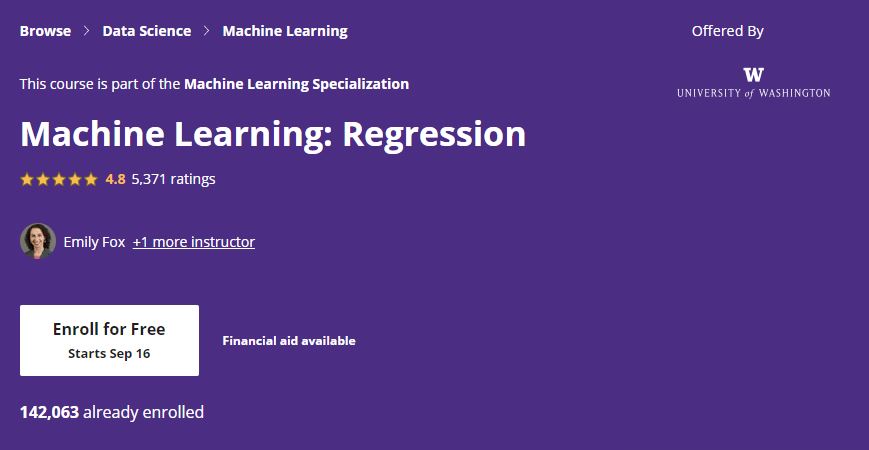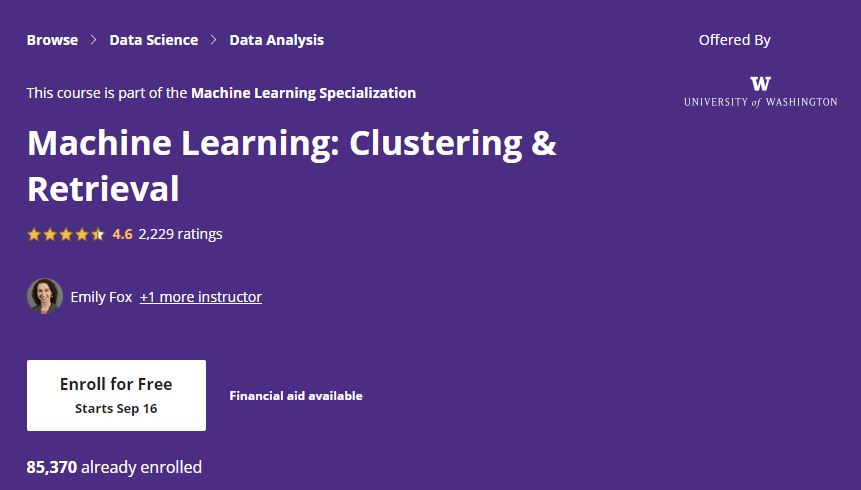A team of 5+ members at takethiscourse.net has compiled down a list of 10 best Coursera Machine Learning. These courses have been compiled after careful research and our team has made sure that all these 10 courses are the best. This means that whatever the course you decide to take from the list will be equally helpful and engaging. The following are the description of the 10 best Coursera Machine Learning.
We have compiled the top 10 best Coursera Machine Learning which will help you learn Machine Learning.
- Machine Learning
- Introduction to Machine Learning
- Structuring Machine Learning Projects
- Coursera Machine Learning: Classification Course
- Mathematics for Machine Learning: Multivariate Calculus
- Coursera Machine Learning: Regression Course
- Machine Learning with Python
- Launching into Machine Learning
- Machine Learning: Clustering & Retrieval
- Practical Machine Learning
List of best Coursera Machine Learning courses:
Machine Learning
-
-
- Stanford University via Coursera
- 54 hours of effort required
- 3,301,832+ already enrolled!
- 4.9 (139,119 Ratings)
-
Machine learning is known to be the science of getting a computer to act without being explicitly programmed. So to understand more about it, you can enroll in this course. In this course, you will be taught all the effective machine learning techniques and how to use them. Similarly, you will also gain practice in implementing them and then getting them to work for yourself. Next, you will learn all the theoretical underpinnings of machine learning. With that, you will also gain practical know-how to quickly and powerfully apply all the techniques to problems. Other topics like understanding data mining, statistical pattern recognition, parametric algorithms, support vector machines, and more will be learned.
Introduction to Machine Learning
-
-
- Duke University via Coursera
- 25 hours of effort required
- 27,237+ already enrolled!
- 4.6 (571 Ratings)
-
From Machine Learning Classes, this course aims to provide you a complete understanding of all the machine learning models. These models include logistic regression, multilayer perceptrons, convolutional neural networks, etc. With that, you will also be taught how these models can solve complex problems in a variety of industries. Additionally, the course has practice exercises that will give you hands-on experience in implementing these data science models on data sets. Similarly, you will be taught to implement machine learning algorithms with PyTorch, open-source libraries used by leading tech companies, and more.
Structuring Machine Learning Projects
-
-
- deeplearning.ai via Coursera
- 5 hours of effort required
- 233,051+ already enrolled!
- 4.8 (40,075 Ratings)
-
If you want to be able to build a successful machine learning project, then this course is your answer. From Machine Learning Classes, the course has two flight simulators that will let you practice decision-making as a machine learning project leader. This will help you get the industry experience you can otherwise get only after years of ML work experience. You will understand how you can diagnose errors in the machine learning system. Next, you will learn to apply end-to-end learning, transfer learning, multi-task learning, and more. Other concepts like understanding deep learning, inductive transfer, and multi-task transfer are also part of the course.
Coursera Machine Learning: Classification Course
-
-
- University of Washington via Coursera
- 18 hours of effort required
- 85,197+ already enrolled!
- 4.7 (3,170 Ratings)
-
From Machine Learning Classes, in this course, you are going to create classifiers that will provide state-of-the-art performance on a variety of tasks. You will be taught all the successful techniques that are most widely used in practice. These include logistic regression, decision trees, and boosting. Similarly, you will be taught to design and implement the underlying algorithms that can help to make these models at scale. Moreover, you will be creating a non-linear model using decision trees. Next, you will be taught to tackle both binary and multiclass classification problems. Not just that, you will also learn how you can implement a logistic regression model for large-scale classification.
Mathematics for Machine Learning: Multivariate Calculus
-
-
- Imperial College of London via Coursera
- 18 hours of effort required
- 54,790+ already enrolled!
- 4.7 (3,241 Ratings)
-
A very productive course that offers a brief introduction to the multivariate calculus required to build common ML techniques. The course starts with a refresher on the “rise over run” formulation of the slope before converting it to a formal definition of the gradient of a function. Next, you will be taught to build a set of tools that will make calculus easier and faster for you. Similarly, you will also learn to calculate vectors that point up hill on multidimensional surfaces. Then you will learn to even put this into action using an interactive game. Topics like linear regression, vector calculus, multivariable calculus, gradient descent, and more will be covered. You can also find out the comparison between machine learning vs deep learning.
Coursera Machine Learning: Regression Course
-
-
- University of Washington via Coursera
- 18 hours of effort required
- 109,144+ already enrolled!
- 4.8 (4,803 Ratings)
-
A course that will help you explore regularized linear regression models for the task of prediction and feature selection. You will be taught in a way to handle very large sets of features and select between models of various complexity. With that, you will also analyze the impact of aspects of your data. These include analyzing outliers on your selected models and predictions. Similarly, you will also understand the input and output of a regression model. Moreover, you will be deploying methods to select between models and exploit them to form predictions.
Machine Learning with Python
-
-
- IBM via Coursera
- 20 hours of effort required
- 136,459+ already enrolled!
- 4.7 (8,672 Ratings)
-
What you will learn in this course is the purpose of machine learning and where it applies to the real world. You will get a general overview of all the machine learning topics thoroughly. These include supervised vs unsupervised learning, model evaluation, and machine learning algorithms. The course has a variety of real-life examples of machine learning that will help you get a grip on the concepts. Through these examples, you will see how it affects the society in ways that you may have otherwise not guessed. You can checkout the trends of machine learning jobs here.
Launching into Machine Learning
-
-
- Google Cloud via Coursera
- 6 hours of effort required
- 23,057+ already enrolled!
- 4.9 (139,119 Ratings)
-
The learning objectives of this course are to help you identify why deep learning is currently popular in the sector. You will learn to optimize and evaluate models using loss functions and performance metrics. Similarly, you will also learn to mitigate the common problems that can arise in machine learning. Moreover, you will learn to create repeatable and scalable training, evaluation, and test datasets in the course. A variety of skills will be gained by you from this course regarding big query, tensor flow, data cleansing.
Machine Learning: Clustering & Retrieval
-
-
- University of Washington via Coursera
- 14 hours of effort required
- 63,015+ already enrolled!
- 4.6 (1,936 Ratings)
-
This challenging course encloses in it a lot of information to help you examine similarity-based algorithms. When you complete the entire course, you will be able to create a document retrieval system using k-nearest neighbors. Next, you will learn to identify various similarity metrics for text data. Similarly, you will also learn to reduce computations in k-nearest neighbor search by using KD-trees. Additionally, you are going to produce nearest neighbors using locality sensitive hashing and much more.
Practical Machine Learning
-
-
- John Hopkins University via Coursera
- 8 hours of effort required
- 109,828+ already enrolled!
- 4.5 (2,876 Ratings)
-
Being a data scientist or analyst, the most common tasks you need to perform are prediction and machine learning. And that is what this course’s learning objective is, to make you understand the basic components of ML. The course is going to provide you with the basic grounding in concepts such as training and test sets, overfitting, and error rates. Similarly, you will be introduced to a range of model-based and algorithmic machine learning methods as well. These methods include regression, classification trees, Naïve Bayes, and random forests. You might also be interested in NPTEL Machine Learning courses at takethiscourse Platform.
 Data Science: Machine Learning
Data Science: Machine Learning
-
-
- Harvard University via edX
- 32 hours of effort required
- 243,508+ already enrolled!
- This course is part of a Data Science Professional Certificate
-
 Principles of Machine Learning
Principles of Machine Learning
-
-
- Microsoft via edX
- 24 hours of effort required
- Skill Level: Intermediate
- Course Type: Self-paced
-
Programming Courses
100+ Courses
★★★★★
Cybersecurity courses
30+ Courses
★★★★★
Business Courses
70+ Courses
★★★★☆
Blockchain Courses
20+ Courses
★★★★★
Data Science Courses
150+ Courses
★★★★★
Mobile App Development Courses
50+ Courses
★★★★★
So pick yourself one of the best machine learning courses from Coursera now and get in the race of learning all about Machine Learning. And don’t forget to keep yourself safe by staying home and never stop learning.



















